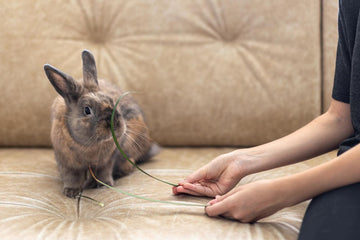
It’s often surprising to see a rabbit displaying aggressive behavior for the first time—biting, raking claws, nipping, or even chasing you across the room. This behavior detracts from the cute, sweet, and sometimes shy image many associate with rabbits. However, as a pet owner, you should understand that jaggression in rabbits isn’t uncommon and doesn’t mean your bunny is mean or untrainable.
Rabbits are intelligent animals. While this aggressive behavior can be intimidating or scary, they are highly teachable. You can take steps to modify your rabbit’s behavior and teach them gentler ways of engaging with you and others. With patience and the right approach, you can help your bunny overcome their aggressive tendencies and become a more relaxed, happy companion.
Why Does Your Rabbit Bite?
Rabbits aren’t inherently aggressive animals—the aggressive behaviors in rabbits stem mostly from behavioral issues rather than genetic ones. This means that the behavior can be changed with time and the right approach—sometimes within as little as four months. It’s necessary for you to initiate the change, understanding that it will not happen overnight. Through proper care, environmental adjustments, and training, your rabbit can learn to trust you and express itself in non-aggressive ways.
5 Common Causes of Aggression in Rabbits and How to Address Them
Understanding what’s causing your rabbit to bite is the first step toward resolving the problem. Below, we outline some common reasons behind aggressive rabbits and solutions to address these behaviors.
1. Hormones
Hormonal changes in unneutered male and unspayed female rabbits can drive aggressive behaviors like circling, mounting, and biting. These are signs of a frustrated rabbit that can escalate over time. Hormonal-driven aggression can also manifest as a rabbit lunging or nipping when you reach into their cage or as hostility towards other rabbits in shared spaces.
Getting your rabbit spayed or neutered can significantly reduce aggressive hormone-related behaviors. If your rabbit has already been altered and is still aggressive, other factors, such as environmental stressors or health issues, may be at play.
2. Pain or Health Issues
Rabbits may bite or lunge if they’re in pain or discomfort. Common health issues like dental problems, joint pain, or digestive issues can contribute to a rabbit's unexpected aggression. A rabbit's face may also be more sensitive if there’s an injury or infection, causing them to lash out when touched.
Schedule a visit with your vet to rule out any underlying health problems. Addressing pain or discomfort may help resolve aggressive behaviors.
3. Fear and Anxiety
Although rabbits have excellent long-distance eyesight, their near-distance vision is poor. A sudden movement or a hand in front of their face can startle them, triggering defensive lunging or biting. Rabbits are prey animals, which means they are instinctively wired to react aggressively to perceived threats.
Approach your rabbit calmly and avoid sudden movements. Keep your hands above their head and away from their nose to prevent startling them. Speak softly and stroke them gently on the forehead. Over time, these actions will build trust and reduce fear-based aggression. If your rabbit lunges at you when you enter their cage, try offering treats by hand to create positive associations.
4. Poor Living Conditions
Rabbits are active, social animals that require ample space to run, dig, and jump. Being confined to a small hutch or cage without enough exercise can lead to boredom and frustration, which may manifest as aggression. Rabbits that are housed in cramped or unsuitable conditions may develop behavioral problems, including aggressive tendencies, nipping, and biting.
Ensure your rabbit has a spacious living area and ample time outside the cage for exercise and mental stimulation. Adding grass pads for small animals like rabbits can provide a safe space for bathroom breaks, especially in indoor setups. For more tips on creating an ideal environment, check out our guide on how to set up a home for your rabbit.
5. Protective Behavior
Rabbits can become aggressive when they feel their territory, food, or babies are threatened. This protective behavior is an instinct that often results in lunging or biting. Territorial aggression is especially common in female rabbits protecting their nests or cages.
Respect your rabbit’s space and avoid reaching into their cage abruptly. Offer treats and speak calmly when entering their territory to show you mean no harm. Gradually introduce handling to reduce territorial aggression. Consider hand-feeding them treats instead of putting them in a food bowl to build trust and mitigate protective instincts over food.

Additional Tips for Managing Aggression in Rabbits
Addressing aggressive behavior in rabbits takes time and patience. Meeting aggression with more aggression will simply worsen the problem. Instead, use positive reinforcement and understanding to encourage calmer behavior.
Create a Safe Space: Ensure your rabbit has a designated safe space they can retreat to when feeling overwhelmed. This could be a comfy bed with blankets, toys, and possibly a crate if they’re crate-trained. Creating a safe space gives your rabbit a sense of security and control over their environment.
Avoid Triggering Fear: Rabbits have a heightened sense of smell and are sensitive to new or strong scents. Wash your hands before handling them to avoid triggering fear or distrust. Speak softly and move slowly when approaching your rabbit to prevent startling them.
Use Positive Reinforcement: Reward your rabbit with treats or praise when they display non-aggressive behavior. Avoid punishing your rabbit, as it can increase fear and aggression. Teaching your rabbit that good behavior results in rewards will encourage them to act calmly.
Provide Enrichment and Exercise: Lack of stimulation can lead to boredom and frustration. Offer plenty of toys, digging opportunities, and ensure your rabbit gets regular exercise outside of their cage to burn off energy.
Establish a Routine: Routines provide predictability and reduce stress. Feed your rabbit at the same time every day, and handle them gently and regularly to build a bond of trust. Establishing routines can prevent fear of the unknown and reduce aggressive behavior.
Handle with Care: Avoid picking up your rabbit abruptly, as this can cause fear and aggression. Gently scoop them up and hold them securely, making sure they feel supported and safe in your arms.
Consult a Professional: If you’re struggling to manage your rabbit’s aggression—the sudden rabbit bites and attacks—seek advice from a rabbit-savvy vet or an animal behaviorist. A health check is essential to rule out any potential underlying medical issues contributing to the aggressive behavior.

Conclusion
Dealing with an aggressive rabbit can be challenging, but with patience, understanding, and the right approach, it’s possible to manage and reduce aggressive behaviors. Remember that every rabbit is different, and what works for one may not work for another. By identifying the cause of aggression, providing appropriate care, and using positive reinforcement, you can help your rabbit become a happier, calmer companion. Over time, your rabbit will learn to trust you and may even start seeking your attention for pets and play.
At Gotta Go Grass, we offer pet-friendly solutions to make your life as a pet owner easier. Our natural grass pads provide a convenient, accessible, and sanitary bathroom option for rabbits, dogs, reptiles, and other small animals. We also offer various pet care products, including waste bags and accessories, to help you care for your furry friends. Visit our website to shop for all your pet needs and discover how we can make pet ownership more enjoyable!



